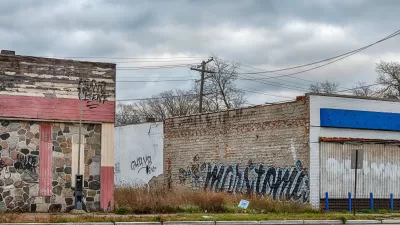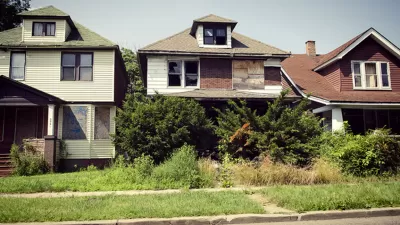John Gallagher investigates a growing trend of unsanctioned urban agriculture in Detroit, where residents have had to take alternative land use into their own hands.
Nearly thirty percent of Detroit's usable land area lies vacant today – not merely plots with abandoned buildings, but "empty fields from which all structures have been removed," Gallagher writes. And among the many alternative uses that residents have thought up for all that space, the most notable trend in recent years has been a surge in urban agriculture, with one farm growing as large as four acres.
"The gardens operate as small, nonprofit, volunteer-based plots on which residents grow fruits and vegetables," Gallagher reports. "In most cases, the food is donated to food banks, given away to neighborhoods or consumed by the growers themselves."
Without an official zoning classification, however, urban farmers in the Motor City have had to operate without legal sanction. There have been formal proposals to make use of the land, from large-scale agriculture to solar fields, "but city government – underfunded, understaffed and risk-averse – has hesitated to approve any of [them]."
In addition to gardens, Detroiters have been fencing in the empty lots around their own homes to create large, "suburban-size parcels" for playgrounds, parking lots, tool sheds, and the like. The practice of claiming these "blots" (a portmanteau of "block" and "lot") has slowly transformed the landscape of the city into one reminiscent of a subdivision. Margaret Dewar, professor of urban planning at the University of Michigan, claims that only 40% of "blots" in the city are on record with the city assessor's office. In Gallagher's words, "That's an indication that many owners are just taking the lot rather than buying it from the city or some other owner."
While Mayor Dave Bing is reaching out to residents to offer guidelines on how to use vacant land, community gardener Kofi Royal remains skeptical of the City's involvement. "Like I always tell people around here, we've got to do this because the cavalry might not be coming."
FULL STORY: With their city shrinking, many Detroiters use empty lots to grow gardens

Planetizen Federal Action Tracker
A weekly monitor of how Trump’s orders and actions are impacting planners and planning in America.

Maui's Vacation Rental Debate Turns Ugly
Verbal attacks, misinformation campaigns and fistfights plague a high-stakes debate to convert thousands of vacation rentals into long-term housing.

San Francisco Suspends Traffic Calming Amidst Record Deaths
Citing “a challenging fiscal landscape,” the city will cease the program on the heels of 42 traffic deaths, including 24 pedestrians.

Amtrak Rolls Out New Orleans to Alabama “Mardi Gras” Train
The new service will operate morning and evening departures between Mobile and New Orleans.

The Subversive Car-Free Guide to Trump's Great American Road Trip
Car-free ways to access Chicagoland’s best tourist attractions.

San Antonio and Austin are Fusing Into one Massive Megaregion
The region spanning the two central Texas cities is growing fast, posing challenges for local infrastructure and water supplies.
Urban Design for Planners 1: Software Tools
This six-course series explores essential urban design concepts using open source software and equips planners with the tools they need to participate fully in the urban design process.
Planning for Universal Design
Learn the tools for implementing Universal Design in planning regulations.
Heyer Gruel & Associates PA
JM Goldson LLC
Custer County Colorado
City of Camden Redevelopment Agency
City of Astoria
Transportation Research & Education Center (TREC) at Portland State University
Jefferson Parish Government
Camden Redevelopment Agency
City of Claremont





























